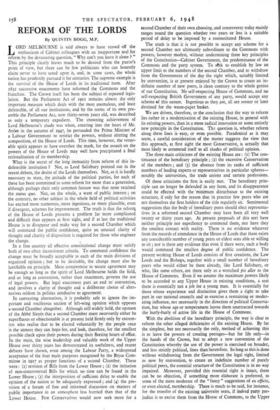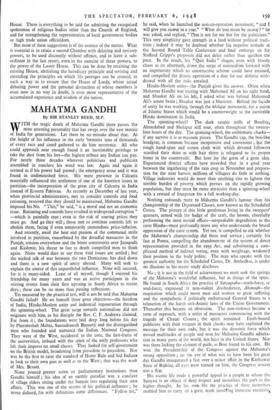REFORM OF THE LORDS
By QUINTIN HOGG, M.P.
IAORD MELBOURNE is said always to have staved off the enthusiasm of Cabinet colleagues with an inopportune zeal for reform by the devastating question, " Why can't you leave it alone ? " This principle clearly leaves much to be desired from the purist's point of view, but there can be few politicians who can honestly claim never to have acted upon it, and, in some cases, the whole nation has prudently pursued it for centuries. The supreme example is the survival of the House of Lords in its traditional form. After 1832 successive enactments have reformed the Commons and the franchise. The Crown itself has been the subject of repeated legis- lation. But the Parliament Act of 1911 remains almost the only important measure which deals with the most anomalous, and least defensible, of all our institutions, and by the terms of its own pre- amble the Parliament Act, now thirty-seven years old, was described as only a temporary expedient. The crowning achievement of Lord Melbourne's shade was when, entering into the heart of Mr. Attlee in the autumn of 1947, he persuaded the Prime Minister of a Labour Government to restrict the powers, without altering the composition, of the House of Lords. This time, however, the vener- able spirit appears to have overshot the mark, for the assault on the powers of the House of Lords may well have precipitated a final rationalisation of its membership.
What is the secret of the long immunity from reform of this in- defensible institution ? Not, as Lord Salisbury pointed out in the recent debate, the desire of the Lords themselves. Not, as it is hardly necessary to state, the attitude of the political parties, for each of these has been committed to some reform for more than a generation, although perhaps their only common feature was that none retained the status quo. Not, on the whole, a want of public interest ; on the contrary, no other subject in the whole field of political activities has excited more numerous, more ingenious, or more plausible, even if divergent, schemes for improvement. The truth is that the reform of the House of Lords presents a problem far more complicated and difficult than appears at first sight, and if at last the traditional House is to disappear and make way for a second Chamber which will command the public confidence, quite an unusual clarity of thought and charity of disposition is required for those who engineer the change.
In a free country all effective constitutional change must satisfy both of two often inconsistent criteria. To command confidence the change must be broadly acceptable to each of the main divisions of organised opinion ; but to be desirable, the change must also be justifiable on principle. Mere compromise to secure agreement may be enough so long as the spirit of Lord Melbourne holds the field, and so long as convention, rather than enactment, governs the use of legal powers. But legal enactment puts an end to' convention, and involves a clarity of thought and a deliberate choice of alter- natives seldom in politics conducive to agreement.
In canvassing alternatives, it is probably safe to ignore the im- portant and vociferous section of left-wing opinion which opposes a second Chamber altogether. Although still widely held, the opinion of the Abbe Sieyes that a second Chamber must necessarily either be superfluous or objectionable is at present held firmly only by extrem- ists who realise that to be elected voluntarily by the people once is the utmost they can hope for, and look, therefore, for the smallest possible check upon their powers during their fleeting hours of office. In the main, the wise leadership and valuable work of the Upper House over thirty years has demonstrated its usefulness, and recent debates have shown, even among the Labour Party, a widespread acceptance of the four main purposes recogniied by the Bryce Com- mittee in 1917 as proper functions of a second Chamber. These were: (s) revision of Bills from the Lower House ; (2) the initiation of non-controversial Bills for which no time can be found in the Lower House ; (3) the interposition of sufficient delay to enable the opinion of the nation to be adequately expressed ; and (4) the pro- vision of a forum of free and informed discussion on matters of public importance in an atmosphere less hurried than that of the Lower Honse. Few Conservatives would now seek more for a second Chamber of their own choosing, and controversy today mainly ranges round the question whether two years or less is a suitable period of delay to be imposed by a reconstituted House.
The truth is that it is not possible to accept any scheme for a second Chamber not ultimately subordinate to the Commons with powers, however modest, without undermining three key principles of the Constitution—Cabinet Government, the predominance of the Commons and the party system. To seek to establish by law an upper limit to the numbers of the second Chamber, and to withdraw from the Government of the day the right which, suitably limited by convention, is at present enjoyed by the Crown to create an in- definite number of new peers, is clean contrary to the whole genius of our Constitution. No self-respecting House of Commons, and no self-respecting British Government of any party, would accept any scheme of this nature. Ingenious as they are, all are sooner or later destined for the waste-paper basket.
We are driven, therefore, to the conclusion that the way to reform lies rather in a modernisation of the existing House, in general with its existing powers, than in a more radical innovation or some entirely new principle in the Constitution. The question is, whether reform along these lines is easy, or even possible. Paradoxical as it may seem, a careful consideration of the matter suggests the view that this approach, at first sight the most Conservative, is actually that most likely to commend itself to all shades of political opinion.
The three main criticisms of the existing House are : (t) The con- tinuance of the hereditary principle ; (2) the excessive Conservatism of the members ; and (3) the absence from its ranks of sufficient numbers of leading experts or representatives in particular spheres— notably the universities, the trade unions and certain professions.
Of these criticisms the first is easily met. The hereditary prin- ciple can no longer be defended in any form, and its disappearance could be effected with the minimum disturbance to the existing structure, if only for the reason that in practice few peers who are not themselves the first holders of the title regularly sit. Sentimental suggestions that the body of hereditary peers should elect representa- tives in a reformed second Chamber may have been all very well twenty or thirty years ago. At present proposals of this sort have neither principle nor expediency to commend them, nor have they the smallest contact with reality. There is no evidence whatever from the records of attendance in the House of Lords that there exists any considerable number of young peers or eldest sons able or willing to sit ; nor is there any evidence that even if there were, such a body would command the smallest degree of public confidence. The present working House of Lords consists of first creations, the Law Lords and the Bishops, together with a small number of hereditary peers who would either be there already, like Lord Salisbury, or who, like some others, are there only as a wretched pis aller to the House of Commons. Even if we assume the maximum powers likely to be accorded to any Upper House in existing conditions, a seat there is essentially not a job for a young man. It is essentially for those whose experience and distinction gives them a right to take part in our national councils and to exercise a restraining or moder- ating influence, not necessarily in the direction of political Conserva- tism, but whose age or temperament leaves them unattracted towards the hurly-burly of active life in the House of Commons.
With the abolition of the hereditary principle, the way is clear to reform the other alleged deficiencies of the existing House. By far the simplest, but not necessarily the only, method of achieving this is to leave the powers of creating peerages—but for life only—in the hands of the Crown, but to adopt a new convention of the Constitution whereby the use of the power is exercised on broader, and less strictly political, lines than heretofore. So long as this is done without withdrawing from the Government the legal right, limited as now by convention, to create an indefinite number of purely political peers, the essential structure of the Constitution is in no way Unpaired. Moreover, provided this essential right is intact, there can be no objection, if something more elaborate is preferred, to some of the more moderate of the " fancy " suggestions of ex officio, or even elected, membership. There is much to be said, for instance, for the transfer of the existing university seats, if indeed party pre- judice is to excise them from the House of Commons, to the Upper
House. There is everything to be said for admitting the recognised spokesmen of religious bodies other than the Church of England, and for strengthening the representation of local government bodies or high trade union officialdom.
But none of these suggestions is of the essence of the matter. What is essential is to retain a second Chamber with delaying and revisory powers, to be used discreetly without offence, and to leave it sub- ordinate in the last resort, even in the exercise of these powers, to the power of the Lower House. This can be done by retaining the existing House, abolishing the hereditary principle and revising and extending the principles on which life peerages can be created, in such a way as to ensure that the House of Lords, whose actual debating power and the personal distinction of whose members is even now in no way in doubt, is even more representative of the accumulated experience and wisdom of the nation.































 Previous page
Previous page